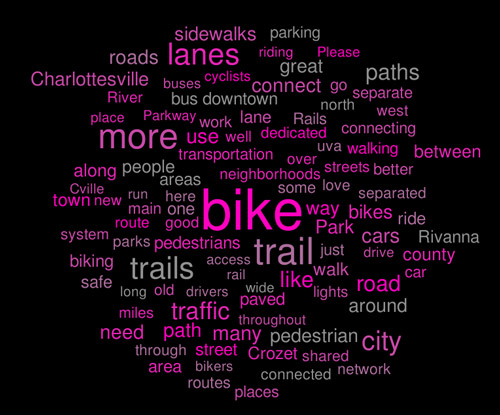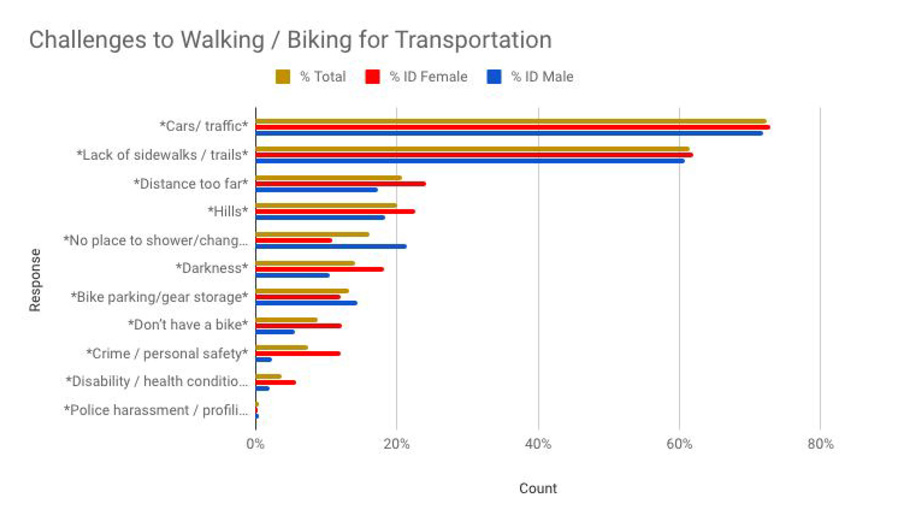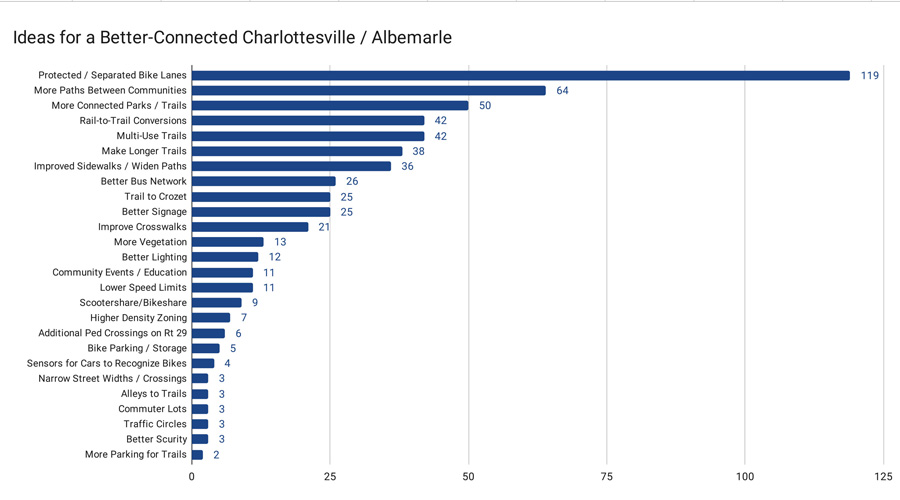
The Piedmont Environmental Council (PEC) is working with the Thomas Jefferson Planning District Commission (TJPDC), the City of Charlottesville, and Albemarle County to envision and implement a comprehensive network of bicycle and pedestrian trails and greenways in the combined urban core. As part of of our extensive community engagement, we created a survey to better understand residents’ ideas about desirable places to walk, ride or run for transportation and exercise. We also asked about the barriers they face and solicited their suggestions for a better-connected community.
857 people responded electronically and via paper copies that were distributed at community events and health clinics. The results confirm much of what we’ve learned in other ways and provide important nuance. We knew, for example, that there is tremendous desire for safe places to walk and bike and we wanted to dig deeper into what that means.
It turns out that although most everyone shares certain concerns, men and women do not see the issue in the same way.
Quantifying Safety and Quality
72% of all respondents (women and men) said that the risk of being injured by a car prevents them from biking or walking for transportation. 64% said it interferes with their exercise. Insufficient time, for example, ranked fourth at 27%.
Women face additional issues with respect to personal security, a concern that is reflected across multiple cues. Women were twice as likely as men (19% vs 10%) to report that darkness is a barrier to exercise; they prefer not to be alone (11% vs 2%); and they prioritize security-related design attributes such as visibility (55% vs 44%), multiple exits (32% vs 24%), many people around (23% vs 13%), and being able to bring their dog (36% vs 24%).

Men on the other hand expressed interest in logistical concerns to transportation, such as changing facilities (21%). When it comes to recreation, men were more interested in variety (46%), insufficient inventory (42%), and challenge (25%).
Intriguingly, both women and men highly value trees but women like them even more than men do (67% vs 57%). It is fascinating that women want spaces that are both nature-rich and social. That means that facilities that are built away from high-traffic areas must employ Crime Prevention Through Environmental Design (CPTED) principles. It also underlines the notion that quality urban spaces must include ready access to nature.
Practical Suggestions
The survey mainly consisted of brief multiple-choice questions, but respondents were also encouraged to suggest new bike/pedestrian greenway routes and to share other ideas. Residents emphasized the importance of infrastructure that keeps them safe from physical harm and offered many practical suggestions such as signage and lighting.

Preferred destinations tended to be popular commercial and arterial corridors as well as existing and likely greenways including the Saunders-Monticello Trail, Riverview and Biscuit Run parks. They’re looking for safe, quality, and useful connections.
The survey results yielded valuable insights into not only what connections are needed but how those connectors need to be designed in order to be welcoming and enjoyable to everyone. Furthermore, it causes us to reflect on whether some of the existing resources we prize (such as the Rivanna Trail) are sufficiently well thought-out or maintained to be welcoming to everyone.
The survey also gives us a baseline that we can revisit periodically to measure progress through the years. We hope that fewer and fewer people will experience barriers to exercising and that more and more people will find it makes sense to walk or bike for transportation.
Read the full report (PDF 3mb) >>
You are also welcome to peak into the raw data, which is rich with suggestions.
Questions about the survey? Please contact Peter Krebs at [email protected] or by phone at 540-347-2334 x7065.
